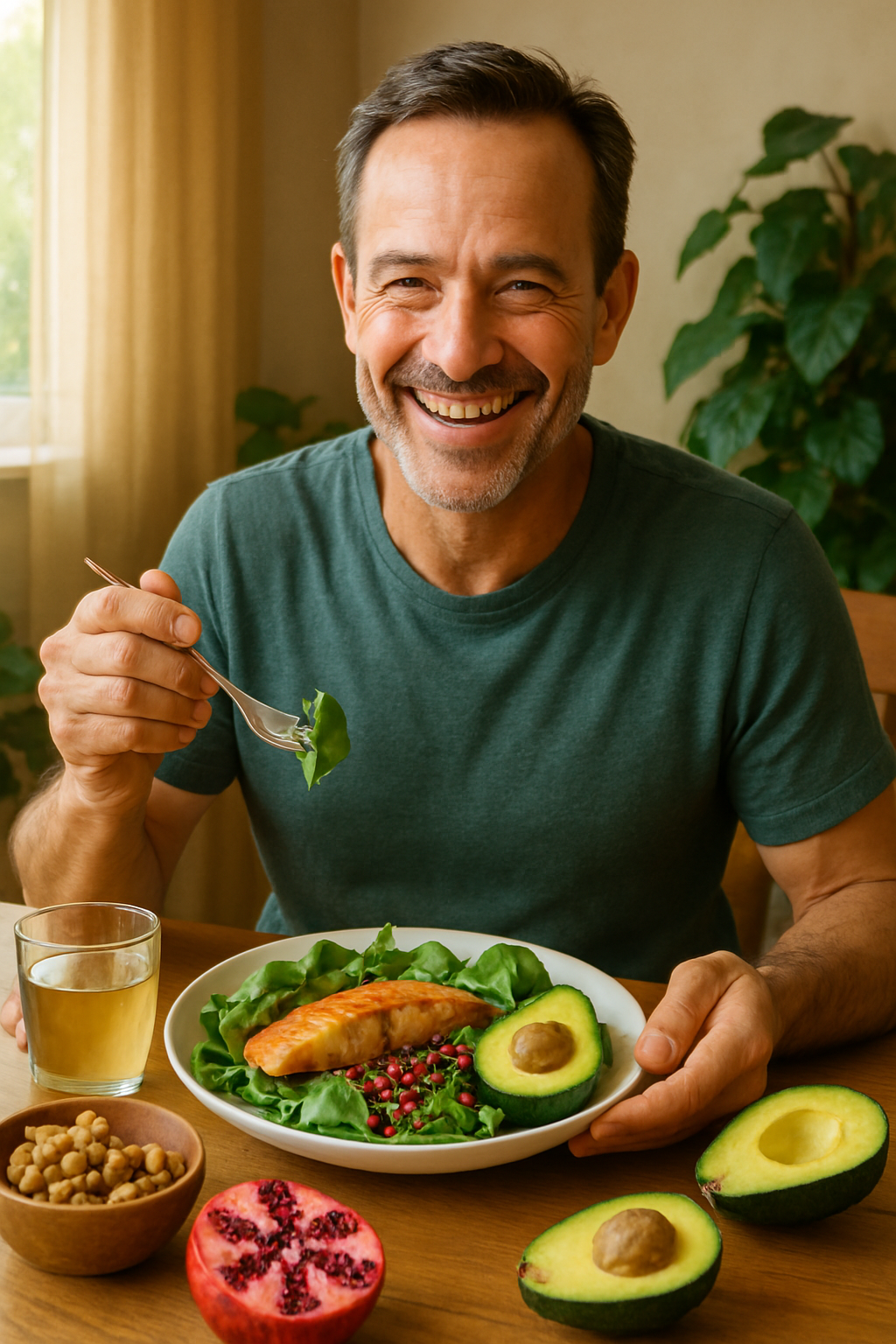You Are What You Eat — Even in the Bedroom
When people think about sexual performance, they often focus on hormones or emotions. But one of the most powerful — and overlooked — influences is nutrition. What you eat directly affects blood flow, hormone balance, energy levels, and even your desire for sex. Poor dietary choices can silently damage the systems that support healthy erections, while the right foods can boost performance, stamina, and confidence. In this article, we’ll break down how diet impacts erections and what to eat (and avoid) for better sexual health.
Erections Depend on Blood Flow and Hormonal Balance
An erection is a complex process involving the brain, blood vessels, hormones, and nerves. The two most essential elements are healthy circulation and testosterone production. Your diet plays a critical role in both. Foods that support vascular health keep arteries open and blood flowing freely to the penis. Nutrients that support testosterone ensure strong libido, energy, and arousal. A poor diet, on the other hand, leads to inflammation, weight gain, insulin resistance, and low testosterone — all major contributors to erectile dysfunction (ED).
The Worst Foods for Sexual Performance
Processed Meats and Fried Foods
These are high in saturated fats and trans fats, which contribute to atherosclerosis — the narrowing and hardening of arteries. Reduced blood flow to the penis is a common cause of ED.
Sugary Foods and Refined Carbohydrates
Consuming high amounts of sugar causes blood sugar spikes, insulin resistance, and inflammation. Over time, this damages blood vessels and hormones. It also increases body fat, which lowers testosterone.
Excessive Alcohol
While moderate alcohol may reduce inhibitions, too much alcohol impairs nerve function, reduces testosterone, and contributes to dehydration — all of which interfere with sexual function.
Soda and Artificial Sweeteners
Sugary drinks contribute to obesity and diabetes risk, while some artificial sweeteners may negatively impact testosterone and gut health, which indirectly affects hormone regulation.
Excessive Soy and Plastics
While soy in small amounts is not harmful, excessive consumption may influence estrogen levels in some men. Also, heating food in plastic containers can expose you to BPA and other endocrine disruptors that interfere with testosterone.
The Best Foods for Better Erections
Leafy Greens (Spinach, Arugula, Kale)
Rich in nitrates, which convert into nitric oxide — the molecule responsible for relaxing blood vessels and improving blood flow.
Beets
Also high in nitrates, beets help dilate blood vessels and improve endurance during sexual activity.
Oily Fish (Salmon, Mackerel, Sardines)
High in omega-3 fatty acids, which support cardiovascular health and reduce inflammation. They also promote healthy testosterone levels.
Dark Chocolate
In moderation, it boosts nitric oxide and improves mood. Choose dark chocolate with at least 70% cocoa content and no added sugars.
Walnuts and Almonds
Packed with arginine (a precursor to nitric oxide), healthy fats, and magnesium — all of which support erections and testosterone production.
Oysters and Shellfish
Rich in zinc, which is essential for testosterone production and sperm health. Zinc deficiency is directly linked to low libido and poor sexual function.
Pomegranates
A natural antioxidant powerhouse that improves circulation, reduces oxidative stress, and may enhance testosterone levels.
Avocados
Full of healthy fats and potassium, avocados help regulate blood pressure and hormone production — both important for sexual performance.
Whole Grains and Legumes
These help stabilize blood sugar, improve energy levels, and reduce inflammation — all of which support a healthy sex life.
Eggs and Lean Meats
Good sources of protein, B vitamins, and cholesterol — which the body uses to produce testosterone.
Hydration Also Matters
Dehydration can lead to fatigue, mood swings, and reduced blood volume — which impairs circulation and performance. Aim for at least 2 liters of water per day, more if you’re active. Limiting caffeine and alcohol can also help maintain fluid balance and hormone stability.
Foods That Support Testosterone
- Zinc-rich foods (beef, pumpkin seeds, lentils)
- Vitamin D (fatty fish, eggs, fortified foods, or sunlight)
- Magnesium (spinach, bananas, dark chocolate)
- Healthy fats (olive oil, nuts, seeds)
These nutrients form the foundation for optimal testosterone production, which directly affects libido and erectile strength.
How to Build a Sex-Healthy Meal Plan
- Breakfast: Oatmeal with walnuts, berries, and a boiled egg
- Lunch: Grilled salmon with quinoa and sautéed spinach
- Snack: A handful of almonds or a piece of dark chocolate
- Dinner: Grilled chicken, roasted beets, and avocado salad
- Hydration: Water with lemon, herbal teas, and a glass of pomegranate juice
Avoid processed sauces, sugary desserts, and fried foods. Keep meals balanced with protein, healthy fats, and fiber to stabilize hormones and energy.
Supplements That May Help
If your diet lacks certain nutrients, supplementation may be helpful. Consider:
- Zinc
- Vitamin D3
- Omega-3 fish oil
- Magnesium glycinate or citrate
Always consult a healthcare provider before beginning supplements, especially if you take medications or have health conditions.
Final Tip: Consistency Over Perfection
You don’t need a perfect diet — but you do need a consistent one. Improving your eating habits for sexual health is a long-term investment. Within weeks of making changes, many men notice better energy, improved mood, and stronger erections. Combined with sleep, exercise, and stress reduction, diet is one of the most powerful tools for restoring sexual vitality and preventing ED naturally.
